Josh Meyer
AfroDigits: A Community-Driven Spoken Digit Dataset for African Languages
Apr 04, 2023Abstract:The advancement of speech technologies has been remarkable, yet its integration with African languages remains limited due to the scarcity of African speech corpora. To address this issue, we present AfroDigits, a minimalist, community-driven dataset of spoken digits for African languages, currently covering 38 African languages. As a demonstration of the practical applications of AfroDigits, we conduct audio digit classification experiments on six African languages [Igbo (ibo), Yoruba (yor), Rundi (run), Oshiwambo (kua), Shona (sna), and Oromo (gax)] using the Wav2Vec2.0-Large and XLS-R models. Our experiments reveal a useful insight on the effect of mixing African speech corpora during finetuning. AfroDigits is the first published audio digit dataset for African languages and we believe it will, among other things, pave the way for Afro-centric speech applications such as the recognition of telephone numbers, and street numbers. We release the dataset and platform publicly at https://huggingface.co/datasets/chrisjay/crowd-speech-africa and https://huggingface.co/spaces/chrisjay/afro-speech respectively.
BibleTTS: a large, high-fidelity, multilingual, and uniquely African speech corpus
Jul 07, 2022
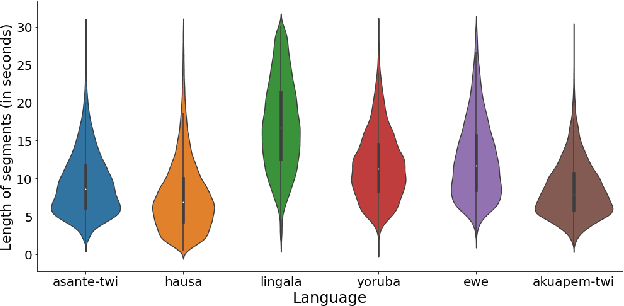

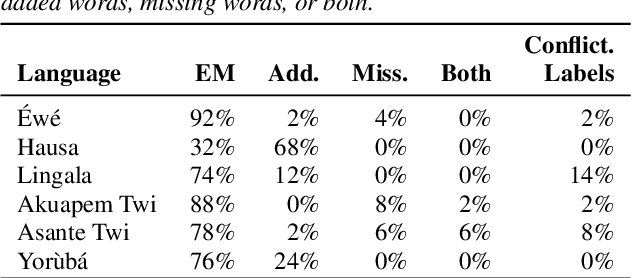
Abstract:BibleTTS is a large, high-quality, open speech dataset for ten languages spoken in Sub-Saharan Africa. The corpus contains up to 86 hours of aligned, studio quality 48kHz single speaker recordings per language, enabling the development of high-quality text-to-speech models. The ten languages represented are: Akuapem Twi, Asante Twi, Chichewa, Ewe, Hausa, Kikuyu, Lingala, Luganda, Luo, and Yoruba. This corpus is a derivative work of Bible recordings made and released by the Open.Bible project from Biblica. We have aligned, cleaned, and filtered the original recordings, and additionally hand-checked a subset of the alignments for each language. We present results for text-to-speech models with Coqui TTS. The data is released under a commercial-friendly CC-BY-SA license.
The Makerere Radio Speech Corpus: A Luganda Radio Corpus for Automatic Speech Recognition
Jun 20, 2022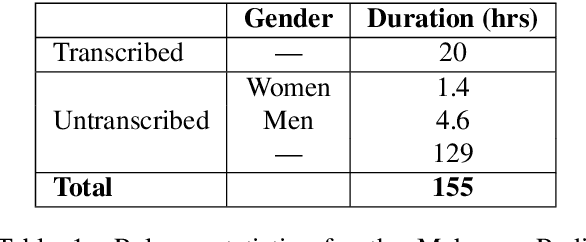
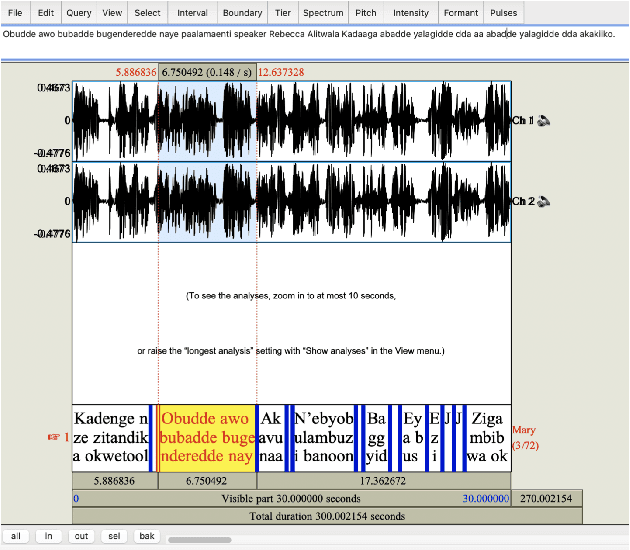

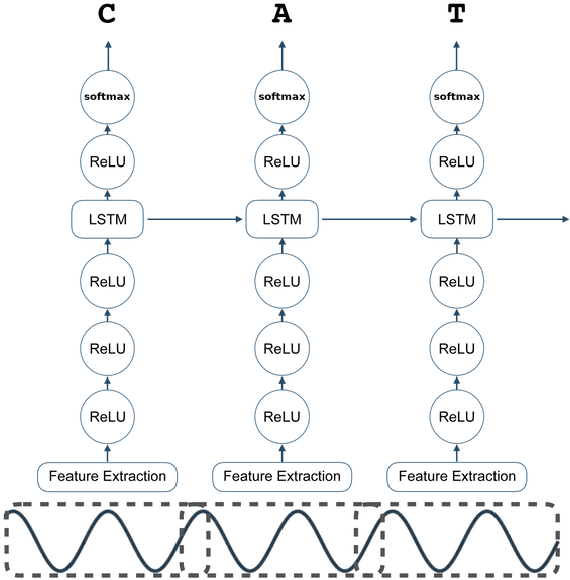
Abstract:Building a usable radio monitoring automatic speech recognition (ASR) system is a challenging task for under-resourced languages and yet this is paramount in societies where radio is the main medium of public communication and discussions. Initial efforts by the United Nations in Uganda have proved how understanding the perceptions of rural people who are excluded from social media is important in national planning. However, these efforts are being challenged by the absence of transcribed speech datasets. In this paper, The Makerere Artificial Intelligence research lab releases a Luganda radio speech corpus of 155 hours. To our knowledge, this is the first publicly available radio dataset in sub-Saharan Africa. The paper describes the development of the voice corpus and presents baseline Luganda ASR performance results using Coqui STT toolkit, an open source speech recognition toolkit.
What shall we do with an hour of data? Speech recognition for the un- and under-served languages of Common Voice
May 10, 2021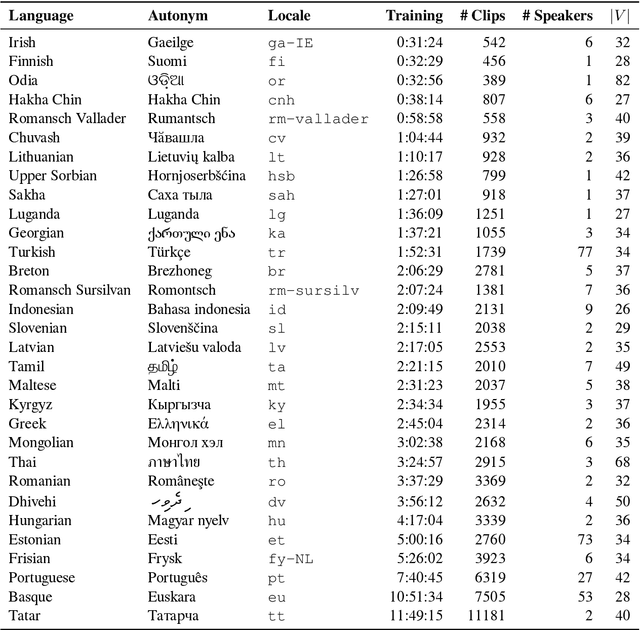
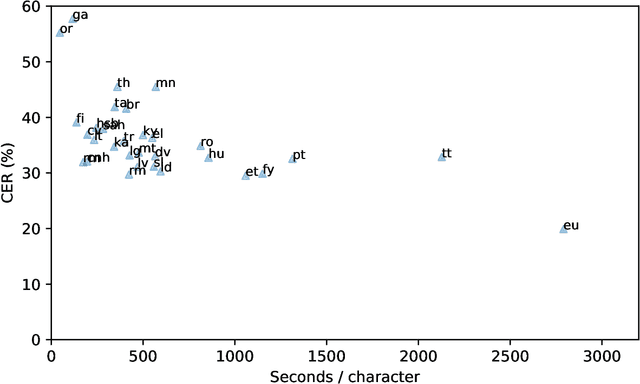
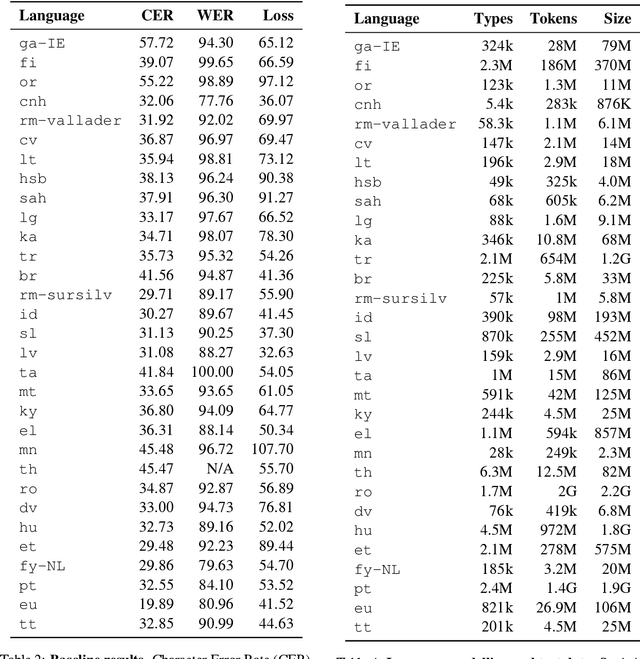
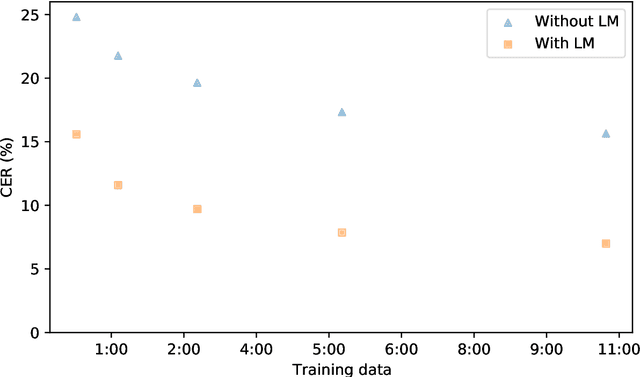
Abstract:This technical report describes the methods and results of a three-week sprint to produce deployable speech recognition models for 31 under-served languages of the Common Voice project. We outline the preprocessing steps, hyperparameter selection, and resulting accuracy on official testing sets. In addition to this we evaluate the models on multiple tasks: closed-vocabulary speech recognition, pre-transcription, forced alignment, and key-word spotting. The following experiments use Coqui STT, a toolkit for training and deployment of neural Speech-to-Text models.
Few-Shot Keyword Spotting in Any Language
Apr 22, 2021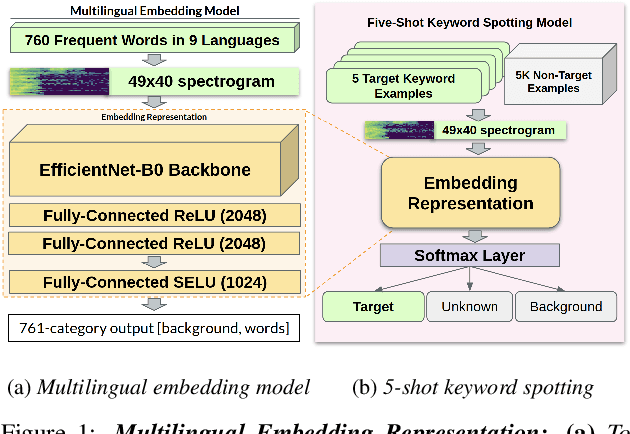



Abstract:We introduce a few-shot transfer learning method for keyword spotting in any language. Leveraging open speech corpora in nine languages, we automate the extraction of a large multilingual keyword bank and use it to train an embedding model. With just five training examples, we fine-tune the embedding model for keyword spotting and achieve an average F1 score of 0.75 on keyword classification for 180 new keywords unseen by the embedding model in these nine languages. This embedding model also generalizes to new languages. We achieve an average F1 score of 0.65 on 5-shot models for 260 keywords sampled across 13 new languages unseen by the embedding model. We investigate streaming accuracy for our 5-shot models in two contexts: keyword spotting and keyword search. Across 440 keywords in 22 languages, we achieve an average streaming keyword spotting accuracy of 85.2% with a false acceptance rate of 1.2%, and observe promising initial results on keyword search.
Common Voice: A Massively-Multilingual Speech Corpus
Dec 13, 2019



Abstract:The Common Voice corpus is a massively-multilingual collection of transcribed speech intended for speech technology research and development. Common Voice is designed for Automatic Speech Recognition purposes but can be useful in other domains (e.g. language identification). To achieve scale and sustainability, the Common Voice project employs crowdsourcing for both data collection and data validation. The most recent release includes 29 languages, and as of November 2019 there are a total of 38 languages collecting data. Over 50,000 individuals have participated so far, resulting in 2,500 hours of collected audio. To our knowledge this is the largest audio corpus in the public domain for speech recognition, both in terms of number of hours and number of languages. As an example use case for Common Voice, we present speech recognition experiments using Mozilla's DeepSpeech Speech-to-Text toolkit. By applying transfer learning from a source English model, we find an average Character Error Rate improvement of 5.99 +/- 5.48 for twelve target languages (German, French, Italian, Turkish, Catalan, Slovenian, Welsh, Irish, Breton, Tatar, Chuvash, and Kabyle). For most of these languages, these are the first ever published results on end-to-end Automatic Speech Recognition.
 Add to Chrome
Add to Chrome Add to Firefox
Add to Firefox Add to Edge
Add to Edge